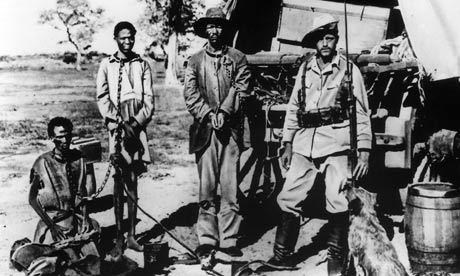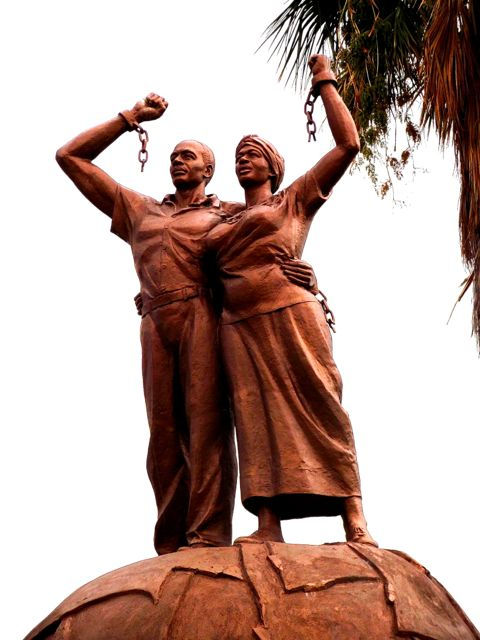“Not without us”: Ovaherero and Nama sue Germany for Genocide Damages

Negotiating the German colonial past remains hotly contested. In a spectacular new twist representatives of the communities directly affected by the 1904-1908 genocide in Namibia have taken the German government to court. With all eyes on the Ovaherero and Nama legal claim for damages, and the international media’s recent interest in the German-Namibian negotiations of the violent and painful past, it cannot be denied that there are also contestations between Namibia’s SWAPO government and the Ovaherero and Nama communities.
On 5 January 2017, Ovaherero Chief Vekuii Rukoro and Head of the Nama traditional authorities David Fredericks filed a class act law suit in New York, invoking the Alien Tort Statute, a 1789 United States law often used in human rights cases. They sue Germany for damages directly to be paid to the descendants of the Ovaherero and Nama genocide survivors. Significantly, the plaintiffs are also seeking an order from the US court requesting that they, as the lawful representatives of the “peoples” directly affected, be included in any negotiations and settlements between Germany and Namibia. This indeed seems to be the critical issue. Ovaherero and Nama victim groups have claimed for some time that they object to the fact that the current talks between Germany and Namibia are taking place without delegates of their communities.
What is most interesting regarding this move is that the Ovaherero and Nama chiefs invoke the United Nations Declaration on the Rights of Indigenous Peoples of 2007. This legal reference and comments by Rukoro, Fredericks and their lawyer, Ken McCallion, indicate that the law suit is naturally directed at transnational restorative justice with the claim for reparations to be paid by the German government for the atrocities committed by its legal predecessor, Imperial Germany. A closer look shows however that with the Ovaherero and Nama claim to marginalised “indigenous minority” status, the SWAPO government’s stance is a matter of concern.
Rukoro gave a nod to the Namibian government when he charged in an interview with The Namibian daily that by refusing to negotiate directly with Ovaherero and Nama delegates Germany had disrespected “our government and our people”. But then, more officially, the chiefs stated in their joint statement that the Namibian government could not adequately and completely represent the interests of the Ovaherero and Nama as “indigenous and minority” communities in Namibia, and even less so those of Ovaherero and Nama people living in Botswana, South Africa, the United States, and elsewhere. Their legal representative further expressed suspicion that reparations, if paid in the form of foreign aid by Germany to official Namibia, might not reach the “indigenous communities directly affected”. So, following the UN’s definition, the Ovaherero and Nama leaders contend that within the context of independent Namibia their people are marginalised.
When the German Foreign Ministry spokesperson, Norbert Schäfer, admitted during a press conference in July 2015 that, “the war on extermination in Namibia from 1904 to 1908 was a war crime and a genocide”, official Germany at long last recognised that the demise of 80 per cent of the Herero and 50 per cent of the Nama of central and southern Namibia constituted genocide committed by the German colonial army in 1904-1908. Starting from General von Trotha’s infamous extinction order the army command clearly had intended to annihilate the local population groups that had risen up against colonial conquest and dispossession. The Foreign Ministry’s acknowledgment seemingly ended a decade of Germany’s ducking and diving tactics, following the ineffective attempt at an apology delivered by Heidemarie Wieczorek-Zeul, then Germany’s Minister of Development Co-operation in Namibia during the Herero genocide centenary commemorations in 2004.
Official Namibian and German envoys have been talking for the past year about the way ahead. These negotiations have been complicated and contested. Although Germany has officially acknowledged the genocide, the formal apology is still outstanding. Most controversial is the issue of reparations. On the one hand, Germany has ruled out explicit reparations, and made clear that it prefers government-to-government payments in the form of foreign aid. On the other hand, and on a related note, Germany has insisted that it won’t negotiate with delegates of the Ovaherero and Nama. German envoys talk with the central Namibian government. Government-to-government negotiations has also been the stance of official Namibia, after the last decade has seen a gradual move by the SWAPO government to take up the issue of the colonial genocide, which had hitherto been left to ethnic-identified opposition politicians-cum-traditional leaders, such as the late Ovaherero chief Kuaima Riruako.

At issue is Namibia’s fragmented history and its dominant nationalist narrative of anticolonial struggles, which has neglected anticolonial resistance in southern and central Namibia, while emphasising the role of the exile SWAPO and, to a lesser extent, the northern Namibian experiences of liberation war. Soon after Namibian Independence in 1990 already, people in southern and central Namibia angrily complained that efforts of development were almost exclusively directed to the country’s northern regions, SWAPO’s heartland. At the same time important symbolic claims of a heroic war-like past were made by Ovaherero and Nama communities, as shown by Reinhart Kössler’s research on the historical re-enactments, commemorative reconstructions and performances, which were constituted in the wake of the genocide. With these commemorations each community asserted its claim to a rightful place in the history of anticolonial resistance in Namibia.
Recent months have seen increased pressure from the genocide victim groups, demanding an inclusive process under the slogan “not without us”. In October 2016, an international civil society congress, “Restorative Justice after Genocide”, brought together over 50 Herero and Nama delegates from around the world with German solidarity activists in Berlin to discuss the way forward, and lay claim through protest action and a press conference with the Herero and Nama delegates, organised by Niema Movassat, MdB (Die LINKE), which was held in the German Bundestag. The law suit filed in New York is sending a strong message to Germany, and to Namibia, that negotiations “not without us” remain unacceptable for some of those whose ancestors were killed in the genocide.